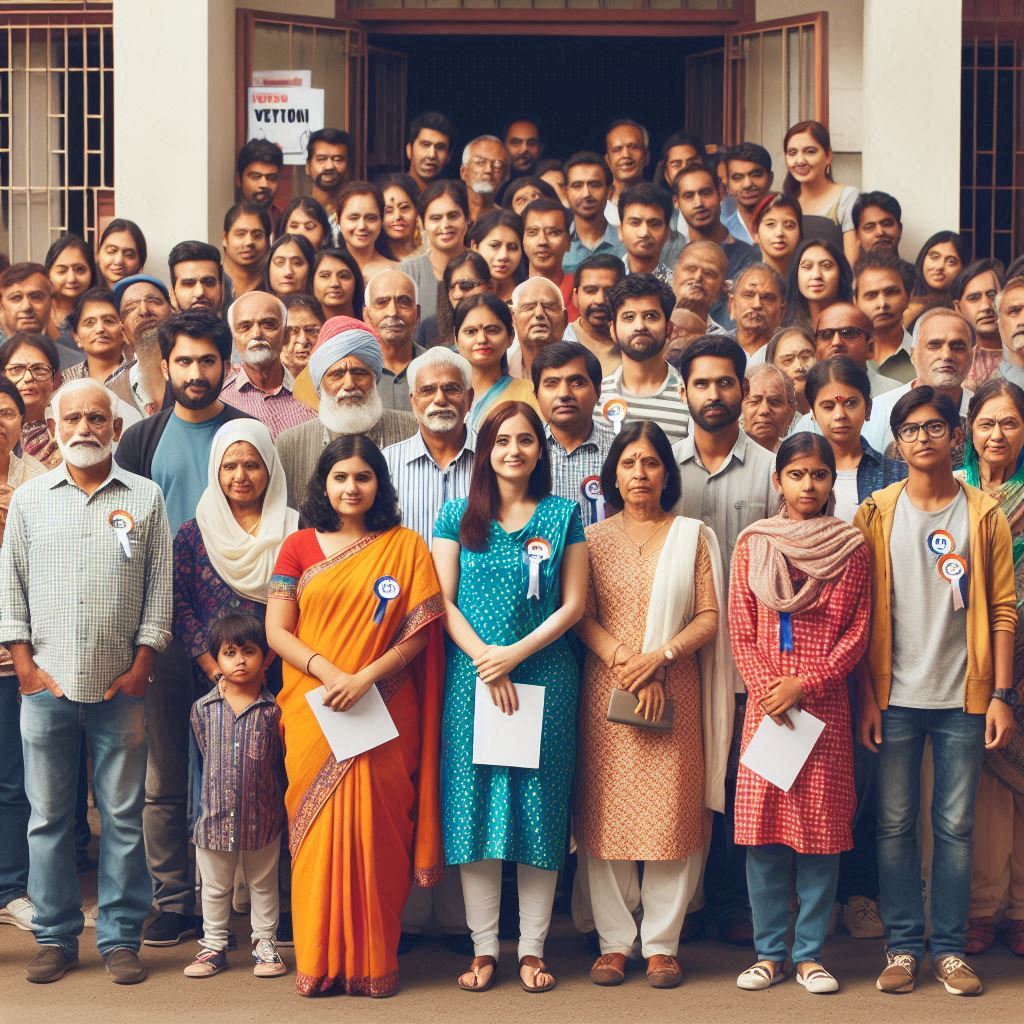
The term “vote bank” was coined by the Indian sociologist M.N. Srinivas. He introduced this concept in the context of Indian politics to describe the practice of political parties garnering support from specific social groups or communities to ensure electoral victories.
Origin of the Term:
The term “vote bank” was first used by M.N. Srinivas in his 1955 paper entitled “The Social System of a Mysore Village.” In this paper, Srinivas discussed the concept in the context of the political influence exerted by patrons over their clients, highlighting the early forms of patron-client relationships that eventually evolved into what we understand today as vote bank politics.
In the 1950s, Srinivas observed that political parties in India often relied on the support of particular castes, communities, or religious groups to win elections. These groups were viewed as “vote banks” because their collective voting behavior could be predictably swayed in favor of a particular party or candidate. The term highlighted the transactional nature of Indian politics, where support was exchanged for promises of benefits, protection, or representation.
M.N. Srinivas observation
- Caste-Based Mobilization: Political parties would mobilize voters based on their caste identities, promising them various forms of material and non-material benefits.
- Patron-Client Relationships: Politicians would act as patrons, providing resources and favors to their client communities in exchange for electoral support.
- Group Identity: The emphasis on group identity over individual preferences reinforced the communal nature of voting behavior.
Relevance in Current Indian Politics
The concept of vote bank politics remains highly relevant in contemporary Indian politics. While the specific groups that constitute vote banks may have shifted over time, the underlying dynamics remain largely unchanged.
Gender
- Women’s Reservation and Welfare Schemes: Political parties often promise and implement welfare schemes specifically targeting women, such as the Janani Suraksha Yojana (a safe motherhood intervention) and reservations for women in local governance bodies. Parties like the AIADMK in Tamil Nadu and the Trinamool Congress in West Bengal have effectively mobilized women voters by focusing on women-centric issues and welfare programs.
2. Caste
- Dalit Vote Bank: Dalits (Scheduled Castes) have been a significant vote bank for various parties. The Bahujan Samaj Party (BSP), founded by Kanshi Ram and led by Mayawati, specifically focuses on Dalit empowerment and has garnered substantial support from Dalit communities in Uttar Pradesh and other states.
- Yadav Vote Bank: The Samajwadi Party (SP) in Uttar Pradesh has traditionally been seen as a party representing the interests of the Yadav caste, a dominant OBC group in the state.
3. Class
- Poor and Lower Middle Class: The promise of economic upliftment and direct benefit transfers has been a common strategy. The Mahatma Gandhi National Rural Employment Guarantee Act (MGNREGA) by the Congress party and schemes like Pradhan Mantri Jan Dhan Yojana (PMJDY) and Pradhan Mantri Kisan Samman Nidhi (PM-KISAN) by the BJP are aimed at appealing to the lower-income groups.
- Urban Middle Class: The Aam Aadmi Party (AAP) in Delhi has targeted urban middle-class voters by focusing on issues like corruption, efficient public services, and transparency in governance.
4. Profession
- Farmers: The Indian National Congress and Bharatiya Janata Party (BJP), among others, have often promised loan waivers, minimum support prices (MSP), and subsidies to attract the farming community. The recent farmer protests against the farm laws and the subsequent political responses highlighted the significance of the farming vote bank.
- Labor Unions: Left-wing parties like the Communist Party of India (Marxist) [CPI(M)] have traditionally focused on labor rights and trade unions, securing support from industrial workers and agricultural laborers.
5. Religion
- Muslim Vote Bank: Parties like the All India Majlis-e-Ittehad-ul-Muslimeen (AIMIM) and Samajwadi Party (SP) have focused on addressing the concerns of the Muslim community, which forms a significant vote bank in states like Uttar Pradesh and West Bengal.
- Hindu Nationalism: The BJP has strategically mobilized Hindu voters through various initiatives and rhetoric emphasizing Hindu cultural and religious identity, appealing to the broader Hindu vote bank across the country.
6. Region
- Regional Parties: Regional parties like the Dravida Munnetra Kazhagam (DMK) and All India Anna Dravida Munnetra Kazhagam (AIADMK) in Tamil Nadu, Telangana Rashtra Samithi (TRS) in Telangana, and Shiv Sena in Maharashtra have successfully capitalized on regional identities and issues to build strong vote banks.
- North-East India: The National People’s Party (NPP) in Meghalaya and the Mizo National Front (MNF) in Mizoram focus on regional autonomy, ethnic identity, and local development issues to secure votes in the North-Eastern states.
7. Linguistic
- Marathi Identity: The Shiv Sena and Maharashtra Navnirman Sena (MNS) in Maharashtra have focused on the Marathi linguistic and cultural identity, addressing the concerns of Marathi-speaking people.
- Telugu Identity: Parties like the Telugu Desam Party (TDP) in Andhra Pradesh have leveraged the linguistic pride and identity of Telugu-speaking people to build a dedicated vote bank.
- Tamil Identity: In Tamil Nadu, the Dravida Munnetra Kazhagam (DMK) and All India Anna Dravida Munnetra Kazhagam (AIADMK) have firmly anchored their platforms in Tamil identity. They champion Tamil language and culture, promoting regional pride and advocating for autonomy. This focus on Tamil heritage and self-determination has fostered strong voter loyalty, making Tamil identity a powerful driver in the state’s politics.
In conclusion, M.N. Srinivas’s concept of vote bank politics remains a critical lens through which to understand the intricacies of Indian electoral behavior. It underscores the persistent role of social identities in shaping political alliances and electoral outcomes.

Kalyan Chandra
Kalyan chandra is a political strategist, media and communication consultant with the expertise in public relations, marketing, political research, election campaign management, psephology and digital analytics. He focuses on strategic political consulting, offering services that include competitive research, public opinion collection, and digital media management. Kalyan has significantly contributed to successful campaigns across India with his meticulous approach and deep understanding of the political landscape.
Related posts:
- Congress Party Manifesto – Telangana 2018 Assembly Elections (Text)
- Dominant Caste in Indian Politics: A Comprehensive Analysis from MN Srinivas’s Perspective
- Ramagundam municipal election results 2020 – complete wards list
- Can actor Vijay’s Political Entry (TVK) Reshape Tamil Nadu politics ? Challenges and Opportunities on the Road to Chief Ministership
- Peddapalli municipal election results 2020 – complete wards list
- The Legacy of Dravidian Parties in Tamil Nadu Politics
